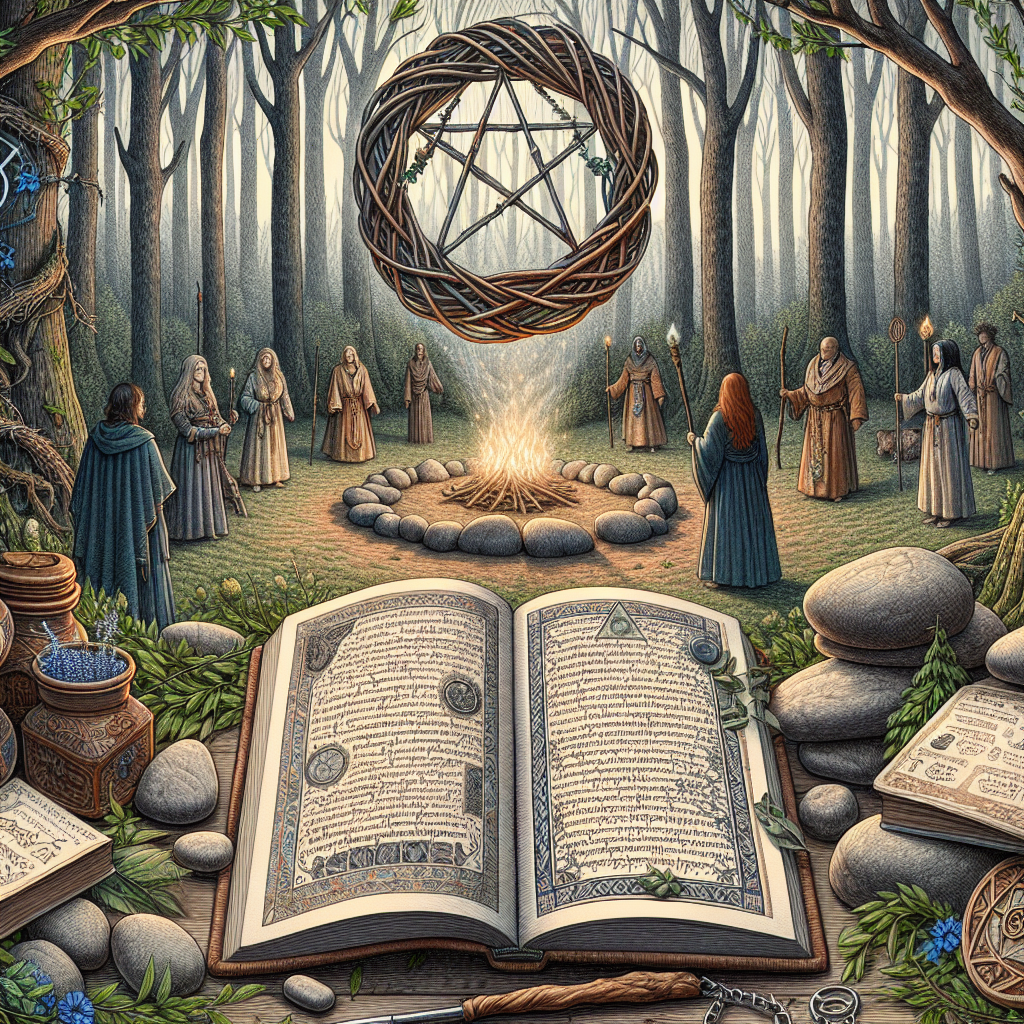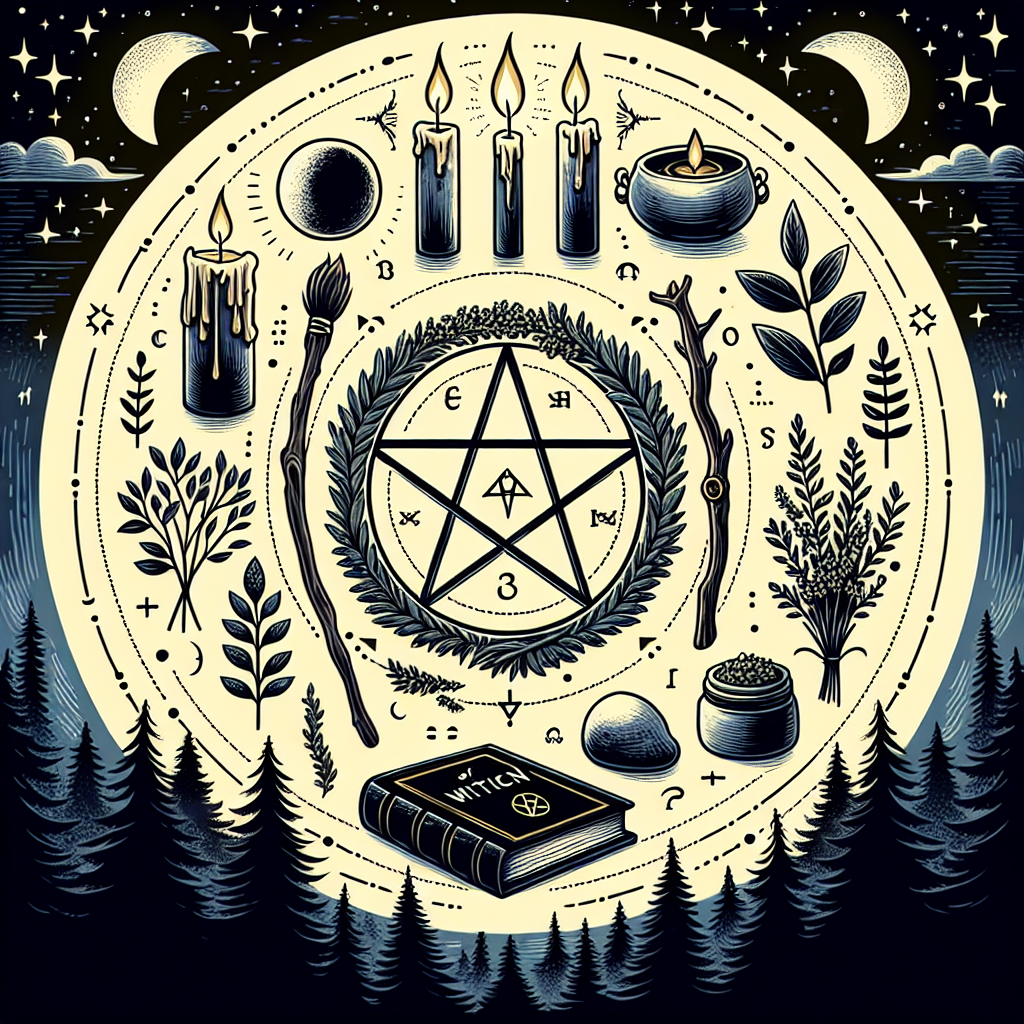As an Amazon Associate I earn from qualifying purchases.

Wicca, also known as the “Craft” or “Old Religion,” is a modern pagan, witchcraft religion that has seen a significant revival in recent decades. It draws from a diverse set of ancient pagan and 20th-century hermetic motifs for its theological structure and ritual practices. Wicca emerged in the mid-20th century through the works and influence of Gerald Gardner, widely considered the “Father of Wicca,” who claimed to have been initiated into a surviving traditional witch coven.
The faith’s theology is largely based on the worship of the Goddess and the Horned God, who are seen as dual aspects of a greater pantheistic divine. Wiccans celebrate a cycle of eight seasonal sabbats and may also observe esbats, which are rituals held at the full and new moons. Central to Wiccan practice is the concept of magic and the belief in the ability to bring about change through rituals and harmony with nature. Ethics within Wicca are guided by the Wiccan Rede — a statement that advises “An it harm none, do what ye will” — and the Threefold Law, which teaches that whatever energy a person puts out into the world, be it positive or negative, will be returned threefold.
Wiccan practices include the casting of a circle for creating sacred space during rituals, the use of ritual tools like the athame (ritual knife), the wand, and the chalice, and the practice of spellwork. Although traditionally initiatory and organized into covens, Wicca has evolved, and many practitioners now identify as solitary witches, following a self-styled Wiccan path. Contrary to popular misconception, Wiccans do not believe in or worship Satan, as the figure of the Devil is not part of their belief system.
As of 2021, the Pew Research Center reports that approximately 0.4% of Americans identify with Wiccan or other pagan faiths, reflecting a growing interest in spiritual paths outside of the mainstream monotheistic religions. The increase in visibility and acceptance of Wicca has been influenced by a cultural trend towards nature-based spirituality and has been popularized through books, movies, and the internet. Furthermore, Wicca’s commitment to environmental stewardship has gained relevance in the context of the global conversation on climate change and ecological conservation.
html
Understanding Wicca: What is the Wiccan Faith and its Core Beliefs?
The Wiccan faith, often termed as Wicca, is a modern, earth-centered religion with roots in ancient pagan beliefs and practices. It is characterized by a reverence for nature, the practice of magic, and the worship of a Goddess and a God, which are sometimes viewed as aspects of a greater pantheistic spirit. Wiccans celebrate the cycles of the moon and the seasons through rituals known as Sabbats and Esbats. The core ethical guideline of Wicca is the Wiccan Rede, “An it harm none, do what ye will,” emphasizing the freedom of individuals to pursue their spiritual pathway as long as it does not harm others. Embarking on this spiritual path opens a world of self-discovery, harmony with the environment, and a unique community. To delve deeper into the intricacies of the Wiccan tradition, the following sections will explore the historical origins, significant holidays, rituals, and the diverse forms of practice within the Wiccan faith.
What is Wiccan Faith? Exploring the Spiritual Path
The Wiccan faith is a modern Pagan religion that emerged in the mid-20th century, drawing from a combination of ancient pagan beliefs, folkloric practices, and ceremonial magick. It was popularized in the 1950s by Gerald Gardner, a retired British civil servant, who is often referred to as the “Father of Wicca.” Wiccans worship the divine in various forms, with a focus on a dualistic view of the Goddess and the God, which are often seen as representative of the moon and the sun or the earth and sky.
Central to Wiccan belief is the concept of reverence for nature, as Wiccans see the divine manifest in all of nature’s creations. This leads to a spiritual path that emphasizes the cycles of life and the seasons, which are celebrated through festivals known as Sabbats and Esbats. The Sabbats correspond to the solstices, equinoxes, and the midpoints between them, marking the changes of the seasons and the agricultural cycle. The Esbats are celebrations of the lunar cycle, particularly the full moon, which is seen as a time of heightened spiritual energy.
Another core principle of Wicca is the ethical guideline often referred to as the Threefold Law or the Law of Three, which holds that whatever energy a person puts out into the world, be it positive or negative, will be returned to that person threefold. This is akin to the concept of karma found in various other religions and spiritual traditions.
Wiccans also often engage in various practices such as spellcasting, divination, and meditation, which are meant to align them with natural forces and aid in personal and spiritual development. Despite common misconceptions, Wiccan spells are not about manipulating others or achieving personal gain but are mostly used for healing, protection, and personal growth.
Rituals and ceremonies are fundamental parts of Wiccan practice. These are typically performed within a sacred circle, which serves as a boundary separating the mundane world from the magical. Ritual tools like the athame (ritual dagger), wand, pentacle, and chalice are used within the circle to direct and channel energy and to represent the elements of earth, air, fire, and water.
Wicca is a largely decentralized religion, with no central authority or universal dogma. Practices and beliefs can vary widely between different traditions and solitary practitioners. Some popular Wiccan traditions include Gardnerian Wicca, Alexandrian Wicca, and Dianic Wicca, each with its own specific set of practices and teachings.
The faith emphasizes personal responsibility, the freedom to worship as one chooses, and the importance of personal experiences and intuition. As such, it is common for Wiccans to develop their own individual interpretations of the divine and their unique ways of practicing their faith.
Wiccan communities tend to be very open and accepting, with many groups, covens, and organizations providing resources and support for practitioners. The internet has also played a significant role in the spread of Wicca, allowing solitary practitioners and those in areas without an established Pagan community to connect, learn, and grow in their practice.
As of the latest figures, Wicca is experiencing growth in numbers, with Pew Research Center reporting in 2014 that 0.4% of Americans identify as Pagan or Wiccan. While this might seem a small number, it represents a quadrupling in the number of Wiccans in the United States since 1990, reflecting a growing interest and acceptance of alternative spiritual paths.
Frequently Asked Questions about the Wiccan Faith
- What is Wicca?
Wicca is a modern, earth-centered spiritual path that follows a polytheistic, nature-based belief system. It incorporates practices such as ritual magic, reverence for the divine as both male and female, and celebration of seasonal festivals known as Sabbats.
- Is Wicca the same as witchcraft?
No, Wicca and witchcraft are not the same, although they can overlap. Wicca is a recognized religion, while witchcraft is a practice that can be part of Wiccan rituals but is also practiced by individuals of various faiths or none.
- Do Wiccans worship Satan?
No, Wiccans do not worship Satan or any embodiment of evil. Satan is a figure in the Christian faith, not Wicca, which emphasizes balance, harmony, and reverence for nature.
- Can one be Wiccan without being part of a coven?
Yes, one can practice Wicca alone as a solitary practitioner or join a coven for communal worship. Solitary Wiccans follow their personal interpretations of Wiccan beliefs and practices.
- Are there holy texts in Wicca?
Wicca does not have a universal holy text like other religions. Some practitioners follow writings such as “The Book of Shadows,” which is a collection of spells, rituals, and teachings that can vary among individuals or covens.
- What are the ethical guidelines in Wicca?
One of the central ethical guidelines in Wicca is the Wiccan Rede, which states “An it harm none, do what ye will,” encouraging Wiccans to live in a way that causes no harm to others or themselves. Another is the Law of Threefold Return, which posits that one’s actions, good or bad, will return threefold.
- Do Wiccans celebrate holidays?
Yes, Wiccans celebrate eight major holidays known as Sabbats, which mark the changing seasons and agricultural cycles. These include four solar festivals (the solstices and equinoxes) and four traditional cross-quarter days.
- How do Wiccans perform rituals?
Wiccans perform rituals to celebrate Sabbats, Esbats (phases of the moon), rites of passage, and other occasions. Rituals may involve casting a circle, invoking deities, raising energy, meditation, spell-casting, and sharing food and drink.
- How is magic used in Wicca?
In Wicca, magic is typically used with positive intent to effect change in accordance with natural laws. It is seen as a tool for personal growth and for manifesting one’s goals in alignment with the will of the divine and the good of all.
- How can someone become a Wiccan?
One can become a Wiccan through self-study, finding a mentor or coven, or by attending classes or workshops. Initiation into Wicca typically involves a ritual acceptance of Wiccan beliefs and a symbolic rebirth into the faith’s community.

Conclusion
The Wiccan faith, a modern pagan religion with deep roots in ancient traditions and pre-Christian beliefs, embraces an ethos of harmony with nature and recognizes the duality of the divine encapsulated by the Goddess and God. Aspects such as seasonal festivals, known as Sabbats, and rites that celebrate phases of the moon, known as Esbats, enrich Wiccan practice, punctuating the wheel of the year with moments of reflection, celebration, and spiritual renewal. Adherents of Wicca often engage in rituals, spell-work, and meditation to foster a deep connection with the natural world and its inherent magic, seeking to enhance personal growth and enlightenment.
Central to Wiccan spirituality is the Wiccan Rede, encapsulating the core ethical guideline “An it harm none, do what ye will,” promoting personal freedom but also responsibility for one’s actions. The practice of magic and the use of spells within Wicca serve as tools for positive change, stressing the importance of intention and the understanding of potential consequences. Throughout its explorations, Wicca empowers individuals to forge a personal spiritual path that is both respectful of the world around them and attuned to the interconnectedness of all life. With its rich tapestry of rituals, reverence for nature, and commitment to a benevolent moral framework, Wicca offers a distinctive spiritual journey for those seeking an alternative to traditional religious paths.
Amazon and the Amazon logo are trademarks of Amazon.com, Inc, or its affiliates.
Continue Your Magical Journey
Free Witchcraft Starter Kit
Get 6 free printable PDFs: grimoire pages, moon calendar, spells, crystals, herbs, and tarot journal.
We respect your privacy. Unsubscribe anytime.
Enhance Your Practice
As an Amazon Associate, I earn from qualifying purchases.

